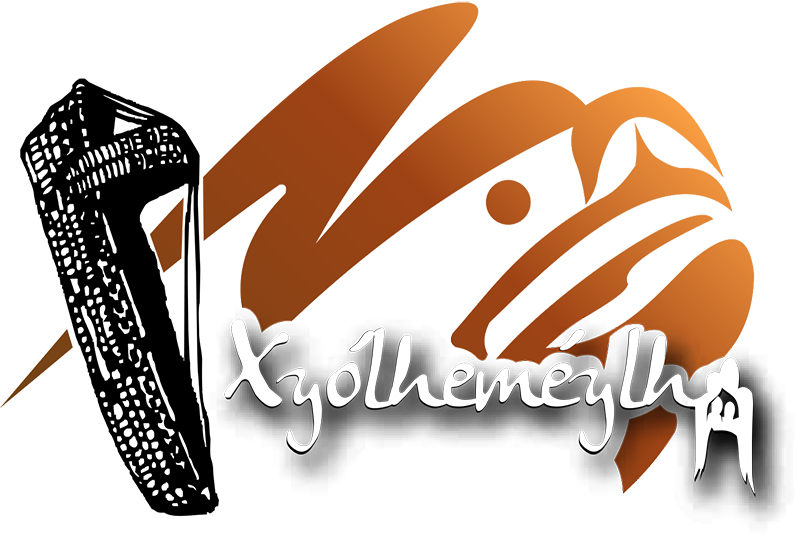Message from the board of directors
Fraser Valley Aboriginal Children & Family Services Society
Sqwélqwel - Xyólheméylh Winter 2022 Newsletter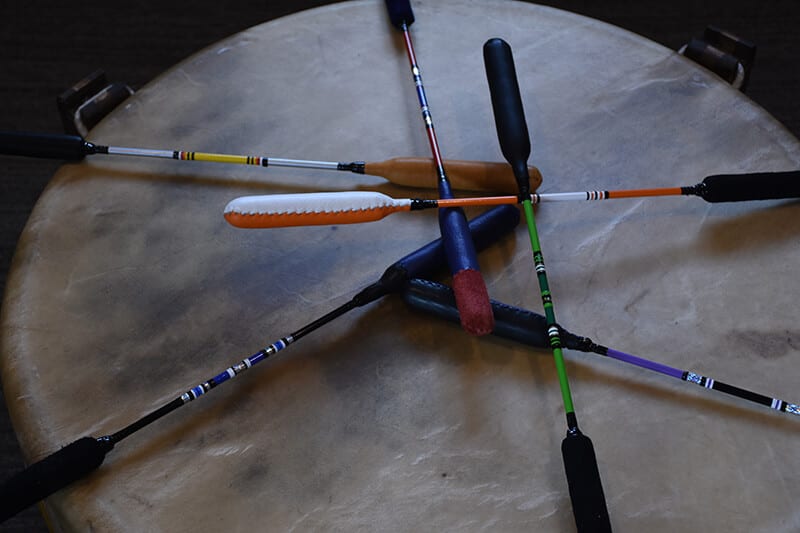
The Board of Directors: Marion Mussell, Dr. Wenona Hall, Glenda Campbell, Peter John, Jennifer Janik, Paula Olmstead, Tammy Bartz, Jolene Irons-McDivitt and Jade Victor. Photo to come when it's safe to gather.
In December we held our Annual General Meeting. We had hoped to hold the AGM in person but once again the meeting was held virtually because of COVID-19 restrictions. It will be wonderful when we can put COVID behind us and see each other in person. At the meeting the Board reported out to the membership on the year’s business and presented the audited financial statements. We also held an election to fill Board seats with the voting handled by the platform Onefeather and the voting process went smoothly. Congratulations to Paula Olmstead and Tammy Bartz, who will return to the board for another term and to Jolene Irons-McDivitt and Jade Victor who were elected to the Board. On behalf of the Board, I extend our gratitude to Judy Douglas and Helen Joe for their work and commitment to serving the on the board during their terms.
If you would like to read about the highlights of the year for 2020-21, our annual report is online at: https://www.fvacfss.ca/fvacfss-2020-2021-annual-report/.
We made significant progress towards our strategic goals this past year, despite challenges presented by the pandemic. The prevention funding our agency receives for those living in the Stó:lō communities we serve has made a tremendous impact. The number of children who left their parental homes has decreased substantially. The number of out of care placements has increased by 40 per cent; those children are not in stranger care, and they are living with family in their communities and connected to their culture. There is still so much more to do. We need to see the same prevention funding available to the children, youth, and families we serve who reside off reserve. That is something we are currently advocating for with the Provincial Government.
I want to let you all know my term as Board President will end this month as per our Board meeting in February. I will continue to serve as a board member until the end of my term. I want to send a heartfelt thank you to all our community partners, Xyólheméylh’ s Executive Leadership Team, Elders and staff, as well as our valued support parents for their support.
All my relations,
Marion Mussell
President, Board of Directors
Xyólheméylh Board of Directions Elections Update
Our agency had a Board Executive Election that took place on February 16, 2022. The results of the Board Executive election process is as follows:
Dr. Wenona Hall, President; Marion Mussell, Vice President; Jennifer Janik, Treasurer; Glenda Campbell, Secretary
We thank the Board for the governance oversight of the agency and for our continued work together.
Christmas 2021
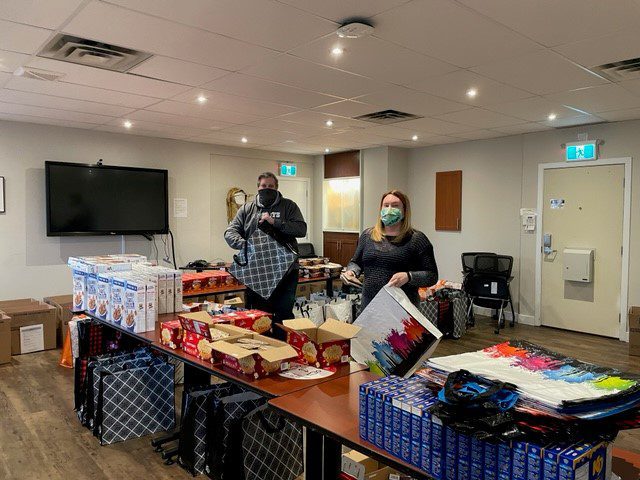
In December we sent Gingerbread House kits to the children and youth in care our agency serves and asked them to take a photo of their creations. We received over 30 wonderful submissions. A panel of Elders and Board members chose their favorites, with the winners receiving $150; $100 and $50 gift cards.
We also held a Christmas art contest and asked Indigenous children and youth in BC to submit their entries. We turned the winning first place entries into our Christmas cards for 2021. Congratulations to all the winners. Trevor and Colby both won first place in their age categories and their art was turned into our Christmas cards.
In December we coordinated over 150 Christmas hampers for families and youth in the Fraser Valley. Thank you to the many individuals who donated as well as generous donations from Loblaws, First West Credit Union, the Willows Family Life Centre and the RCMP Langley Division. We couldn’t have shared some Christmas joy with these families without them.
Message from the executive Leadership Team
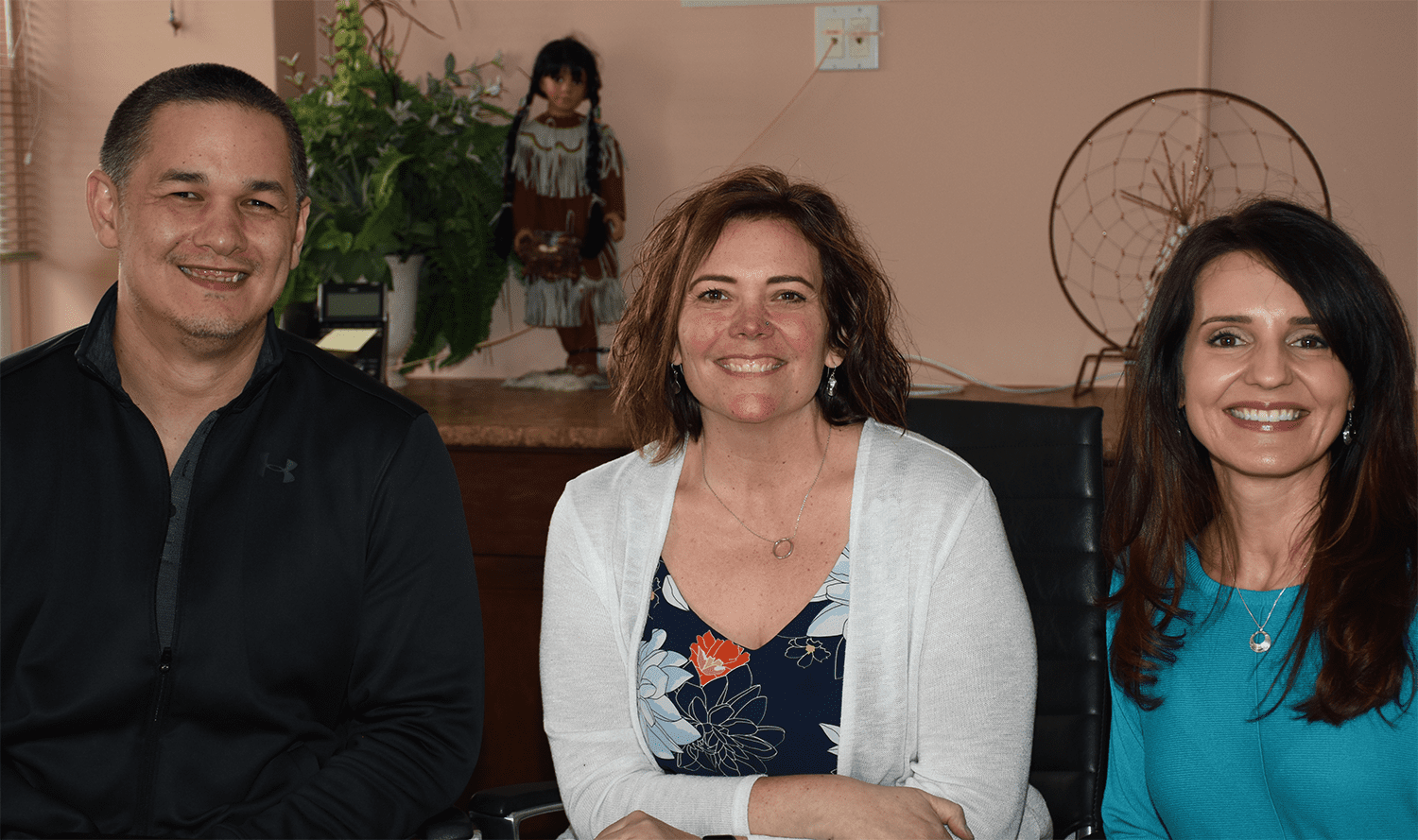
Hi everyone! We hope everyone had a nice Christmas holiday and Happy New Year. The winter season gave us time as a leadership team to work on our strategic planning for 2022 and to come up with more ideas from feedback we have received to help move the agency continue to forward in a good way. We have several updates to share with you all.
Our Elders Advisory Council are incredibly busy and are doing a phenomenal job guiding the agency sharing their knowledge and their wisdom. We have over 12 Elders on our Elder Advisory Council and a number of Elders who are involved in other initiatives with us. Our Elders being partnered with youth is going well and is continuing to expand. The youth love learning their culture; their inherent right to identity. Our Elders are receiving so many referrals that we are at a place now where we need to hire an Elder coordinator! It’s exciting to see the difference this is making.
Caregiver Support Parents: We put out a survey to all our staff and caregiver support parents and got some very good feedback that will continue to help us develop plans to help move the agency forward in a good way. We could not do our work without them, they are a key part of our team. A copy of the survey is further down in the newsletter.
Office Location Update:
We are very proud of two new office locations we have just opened to continue to work towards the best service delivery we can for those we serve. We opened a Space on Spadina in Chilliwack next to the Pharmasave on Spadina and Main Street. This office is down the street from our Youth Hub and is a place where families can receive wrap around supports. We will be liaising with our partners at Fraser Health, FNHA and Stó:lō Health as we have two offices for external partners to lease. Our goal is to have counsellors and a nurse practitioner on site at a minimum. There is an elder’s area as well for staff to and families to talk to our elders.
In addition to the Space on Spadina, we have just signed a lease with Shx’wha:yVillage. Our goal is to eventually be in all 17 communities we serve.
Renovations are underway for a new office in Mission that will be completed this year. After this move this means our agency will no longer occupy any spaces in former Residential Schools.
We are currently meeting with architects and have the preliminary drawings completed for a new building on Coqualeetza Property.
Update on Practice:
Prevention and early intervention continue to be the forefront of practice for our staff. In late 2021, the Agency launched its practice framework entitled “Indigenous Collaborative Practice Model: Creating Safety, Family and Cultural Connections through Collaboration.” The guide was developed by a working group which consisted of Elders, agency leadership and front-line staff. The purpose of the framework is to guide staff through the life span of a file and ensure that we are working collaboratively with family and community at each step. The guide marries the policy and practice standards that our staff must follow, while enabling Indigenous children, families, and communities to lead and develop plans for their future. This model relies on a fundamental element of Indigenous practice, the circle process. This process is strengths based, holistic and speaks of the vital importance of strengthening relationships through sharing, collaborating, and striving for consensus in collective decision making. Through early 2022 staff will continue to be oriented on the guide as we implement it as the focus for the Agency.
The collaborative practice framework goes hand in hand with the Agency’s increase in out of care placements. When a child must come out of their parental home for any number of reasons, we are striving to ensure that we are placing with family or community whenever possible. The Agency is working diligently to support our out of care caregivers and families to support children remaining out of stranger care placements. We have seen lots of success in this area recently and will continue to ensure family is at the fore front of our decision making.
As an ELT we are continuing to advocate for substantive equality; in particular equality of prevention services regardless of where someone resides. Our leadership team met and identified the 5 key areas of substantive equality being part of a Delegated Aboriginal Agency that was built under a colonial model. We will be going to Provincial office this spring to present on substantive equality. We are working on a plan so as an agency we will be responsible for all the service lines that are currently being delivered by our partners at MCFD and have elders providing guidance for the services being delivered in these key areas.
In closing we are working to do our best and know we still have a lot of work to do. We are trusting that the Creator has a plan for our agency, and we commit to keep moving things forward in a good way for the children, youth and families we serve.
Message from Penny Trites, ED Staff & community relations
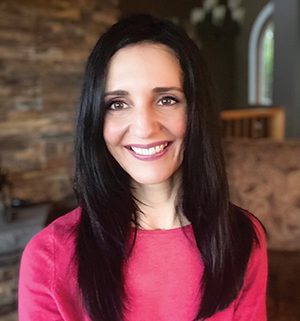
The Light Within Each of Us
As I contemplated what message I wanted to convey for the agency winter newsletter what came to my heart and to my mind is “Trust the Creator.” It’s a tough time in the world for many of us, and not where any of us expected to be. My immediate family, like many, had COVID, and it took time for us to recover. I just lost my stepbrother unexpectedly and that has left all my family devasted and heartbroken. Good friends of mine and many reading this have lost loved ones. I asked the Elders in a meeting: “how do we get through all this?” One of the Elders said, “we have to stay positive.” I try to look for something good in every day that comes, even in these times of darkness.
I was having a further conversation with a Matriarch who has been instrumental in my life. She shared with me that “Our ancestors are with us. When we light a candle, the ancestors hear our prayers. We have the light within each of us, and we need to think good thoughts and speak the light of what we want to see in our lives. Our words have power and can change what we are going through.” This really echoed what the Elder said to us about staying positive. This has taught me that we all have light to shine even in the darkness we may be feeling, and we need to speak the light of what we want to see even in difficult situations.
The light I want to speak about are the past two years with the agency that have been the most challenging of my 24 years in this field of work. It is the place where I feel a sense of family that I have never felt before. It is where I feel inspired each day when I see the difference that is being made for the children, youth, and families we serve. I couldn’t imagine working anywhere else. I could not be prouder to serve where I am despite all the challenges we are all facing. I see and feel love, compassion, commitment, passion, and tireless dedication all around me.
I pray each of us will have faith and trust the Creator to give each of us great strength and keep our thoughts going in the right direction. We have the light within each of us and can choose to shine even in the greatest darkness.
Gratitude Art Exhibit
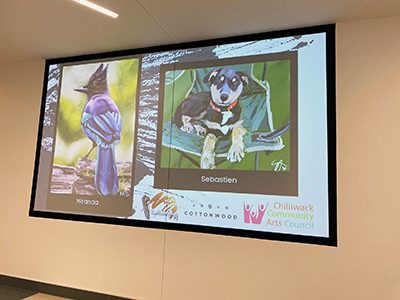
Last spring we asked BC Indigenous children and youth what they were grateful for and to express it in art. We received so many wonderful submissions expressing gratitude for nature, pets, family, sports and even ice cream. A panel of our Board members and Elders had the difficult job of choosing six winners in two age categories. The art is now on exhibit at the Cottonwood Centre in Chilliwack. We would like to thank the Chilliwack Community Arts Council and the Cottonwood Centre for organizing the exhibit.
voices of indigenous children & youth
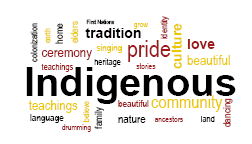
In honour of National Indigenous Peoples Day this past Monday, June 21, Xyólheméylh held its second annual writing and video contest. Xyólheméylh asked British Columbia Indigenous children and youth to express what being Indigenous means to them in writing and/or video. The entries were judged by a panel consisting of Xyólheméylh’s Board of Directors and Elders Advisory Committee, in three categories – ages 5 to 10; ages 11 to 14 and ages 15 to 24.
Children and youth expressed pride in being Indigenous and their connection to nature. They also expressed their sadness about missing and murdered Indigenous women, the impact of residential schools, and their grief about the discovery of unmarked graves at the residential school in Kamloops Here is one of the many wonderful entries we received.
Ey swayel my name is Angie
I am from the Haisla and Cree nation. Being indigenous to me, means having a connection to this land, being proud of who I am and where I come from. It means being a protector of the land, protecting the land for the next 7 generations. I am proud to be indigenous because it means that I come from a long line of survivors and fighters. I honour my ancestors because they were resilient and brave, and because I wouldn't be here today if it weren't for them. I celebrate my culture by sharing traditions with every person I can. Spreading awareness of indigenous issues and telling the truth of Canada’s dark history, Speaking up for those who couldn't. I am admirable because I have to work twice as hard to get half as far. Being indigenous means that I am fearful for my life, because I am discriminated against for the colour of my skin. Indigenous lives are overlooked, so I have to be brave and keep fighting for our rights no matter how many people try to silence me. I used to be embarrassed of my culture because of peterman (r*dskin scene) and I got teased at school, my indigenous features didn't fit the beauty standard. I've learned overtime that I should not be ashamed because being indigenous means I am unique. Being indigenous means that we are the people of the land, and we must live with pride and inspire one another.
Meet Caregivers Petrona and Sergio Castillo-Cortez
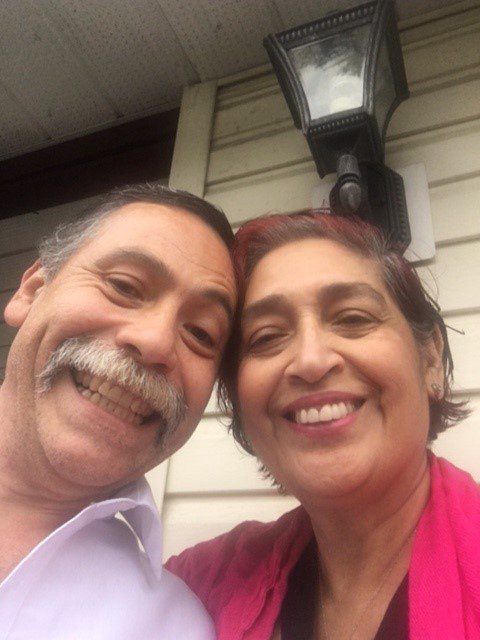
Petrona and Sergio Castillo-Cortez became caregivers because they were very grateful to be able to come to Canada from their native El Salvador and wanted to give back in some way. Arriving in Canada in 1983, they became involved in the community, volunteering as peer counsellors, interpreters, and helping in any way they could. “But we wanted to do more,” says Sergio.
It was after Petrona met a caregiver that she and Sergio decided to become support parents. They also had an affinity with First Nations culture and people, and felt it was very similar to their own Central American culture – respect for Elders, the philosophy that it takes a village to raise a child, and a sense of community-mindedness and caring for each other.
Since they started fostering in 1999, they have cared for over 40 children and taken courses to understand Indigenous culture and history. They were fortunate that their own kids who are now grown, were open to sharing their home with other kids.
They are currently support parents to three children, age nine, eight and five. All three children are connected with their families. Petrona and Sergio refer to themselves as being a bridge between the children and their parents and grandparents. “I have come to love the connections we have made with the families,” said Sergio, “It makes it easier for the families to reunite.”
The appreciation is mutual. Petrona and Sergio were honoured in ceremony several years ago by Sheehan:y Village for their work as caregivers to Indigenous children. They encourage the children to stay connected with their culture, attending summer camps and cultural events with them. “Culture is crucial,” says Sergio, who says it’s been a challenge during COVID to do these things virtually.
In addition to being connected to their own culture, the children have gotten to know Petrona and Sergio’s culture, learning some Spanish words. “They especially love the food,” says Petrona. The children call Petrona and Sergio “Abuelita y Abuelito” – the Spanish words for grandma and grandpa. In fact, Petrona laughs that some people, such as teachers at the school, also call her Abuelita.
Xyólheméylh thanks Petrona and Sergio for opening their hearts and their home to children who need it.
New feature: Si:yólexwe teachings
Meet an elder: Maria Reed (Waabigekek Ikwe)
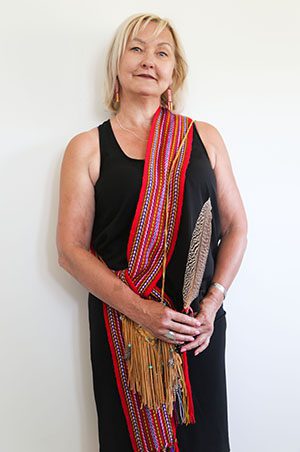
When Maria was a child she had a reoccuring dream that she was being chased on horseback by “wild Indians.” Back then, she didn’t know she was Indigenous, but now that she knows, the dream makes sense symbolically.
Like so many Indigenous people, her parents and grandparents were robbed of their heritage in residential schools and were fearful of discrimination, so they didn’t practice their culture.
Like the dream she had as a child however, Maria’s Indigeous background would eventually catch up to her in her teens when one of her aunts discovered the family’s Indigenous roots.
Maria hasn’t looked back since, immersing herself in the culture. Her great grandmother was from the Batchewana First Nation in Ontario and her great grandfather was French and Métis. Maria is French, Cree and Ojibeway on her father’s side and Swedish Sami on her mother’s side. The Sami are Sweden’s Indigenous people and known as Reindeer Herders.
Since finding out about her Indigenous roots in her teens, Maria has immersed herself in learning about her culture. “When I found out it was one of those ah ah moments,” says Maria. Her Indigenous name, Waabigekek Ikwe, means White Hawk Woman.
Maria loves being an Elder and feels that everything she has done in the fields of wellness - body, mind and spirit, has come together to prepare her to be an Elder.
Early on Maria took a course on Indigenous culture that exposed her to sweats, smudging, circles and healing practices. Maria has worked as Life Skills Coach, a Human Relations Councillor and spent years working with Fraser Valley Aboriginal Health Council on health and wellness initiatives and as an Elder with Circle 5. “I learned a lot about human nature and a lot about myself,” says Maria.
She credits her greatest learnings to fellow Elders. “You learn about all the different cultural practices. The more teachings you learn, the more you find out about human nature,” says Maria. “In our business we work with people and the more you can understand where they come from, the better you can work with them,” says Maria.
Maria says she is not much of a person for hobbies. “I love what I do,” says Maria, who prefers to spend her time working or spending time with her two daughters and grandchildren. She says she loves challenges, creating systems that work well, and helping people. She is a problem-solver by nature. She is also a life-long learner and is currently taking a course on death and grieving.
Maria believes Elders set the tone and bring culture and wisdom. She says it took time at Circle 5 to build that culture so that it became a natural way to do things. She urges staff to reach out to the Elders, to build relationships.
She believes the Indigenous world view of everything being connected is essential to the work of the Agency. “No one is better than anyone or anything else,” says Maria.
Medicine Teachings with the Elders
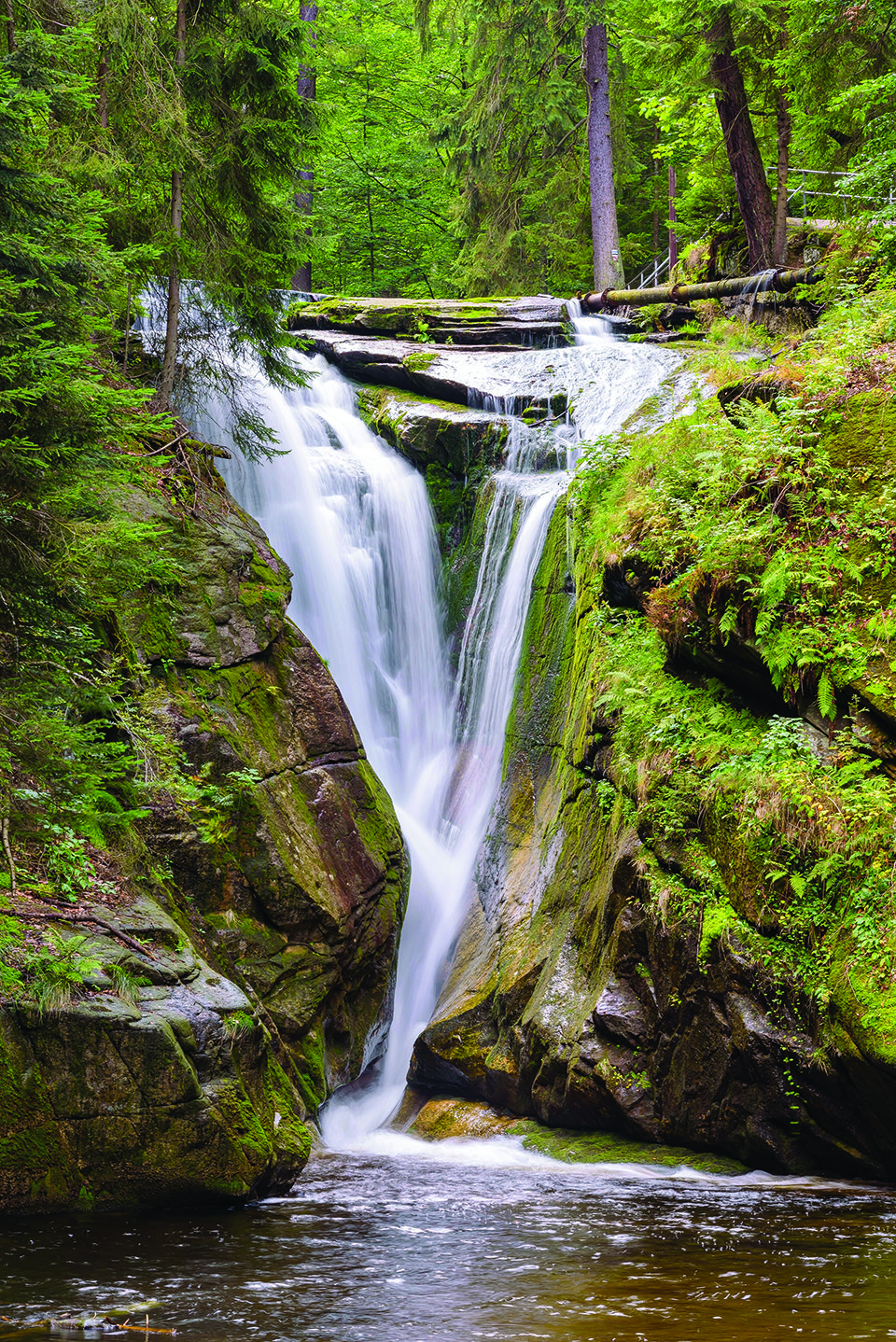
Medicine Teaching: Fasting and Winter Bathing
Fasting and cold-water bathing are often done together in the winter months to cleanse and rejuvenate the spirit. The fasting part involves drinking only natural teas and water for one to four days, depending on one’s physical condition and health. The fasting cleanses the body and mind, and it is common to experience visions and dreams. For example, an ancestor or an Elder may come to you in your dreams to give you guidance during this time.
Everyday of the fast, you would also go to the mountains before daybreak to submerge yourself in the water. Traditionally this was done naked. However, because of interference with traditional ways, specifically unauthorized cameras being placed in the sacred grounds, it is recommended that people wear some clothes, even underwear, or shorts these days.
Prior to getting in the water, a person prays to the Creator in the four sacred directions. The person can pray for themselves, their family or loved ones. Before getting in the water the person brushes themselves down with a cedar bough or sand on the beach. When the person is ready to get in the water, they dunk themselves in the water, submerging the whole body including the head in the water four times. The water cleanses the body, mind and spirit and washes the tears away.
- Xyólheméylh Elder Julie George (Lexlexwenel)
ask an elder
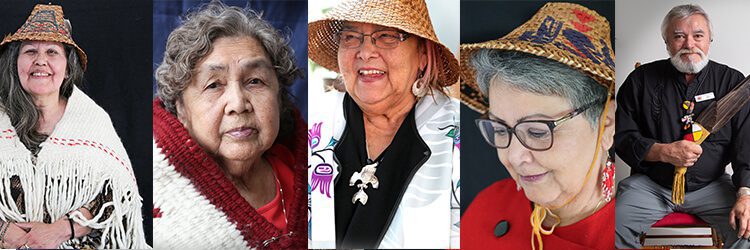
As we approach the second year of living through the pandemic, we thought we would ask our Xyólheméylh Elders how they are coping and if they had any advice for us. Here’s what they said:
“I am personally coping with COVID because, we as a family, decided early on that we would stay connected by in person visits. My twin sons and their family were a ‘life support’ for my husband and myself. My husband was diagnosed with a serious disease at the same time COVID began; we needed one another. To stay as safe as possible we all took safety precautions and improvised as require. Advise for others; please do not let fear control your life." - Sheree Epp
“Acceptance, this is the way it is right now, it is out of my control. I do what I can and know that it will pass, acknowledge and give thanks for what I have, stay close with my family. Look for creative ways to do things that we can do :)” - Maria Reed
“Personally I have been coping with COVID 19 by: keeping myself healthy by walking, eating right and wearing my mask. I also keep in touch with my family by telephone, I volunteer twice a week & when at home I keep myself busy by crocheting.”- Louise Silver Kaarsmaker
“For me right now it’s easy, my back and leg are pretty sore, so I only do things I have to do, go get groceries when I need to. Right now I still mask up every where I go, with covid on the rise again I never take chances, and I always have done that throughout the pandemic. I keep to my bubble, my son’s place is my outing, and only once a week , just to carve, and that right now is on hold too. I carve with a friend of mine and that was once I found out he was vaxxed, so very careful and that’s the way it will be until this virus has been deemed under control.” - Gil Poitras
“I cope with COVID by working at staying connected with family and friends regardless of where they live virtually or distanced. Although high risk, a meal out is my mental health break. I minimized the risk by choosing restaurants that have good COVID practices, adequate plexiglass, distancing, good airflow and choose times when there are less patrons. I recommend choosing something that helps add a sense of belonging and spiritual practices that help to balance our life.” - Donna Simon
“Do not let COVID control you, you control COVID. Stay positive.” - Rosemary Trehearne
Community Profile: Leq’a:mel First Nations
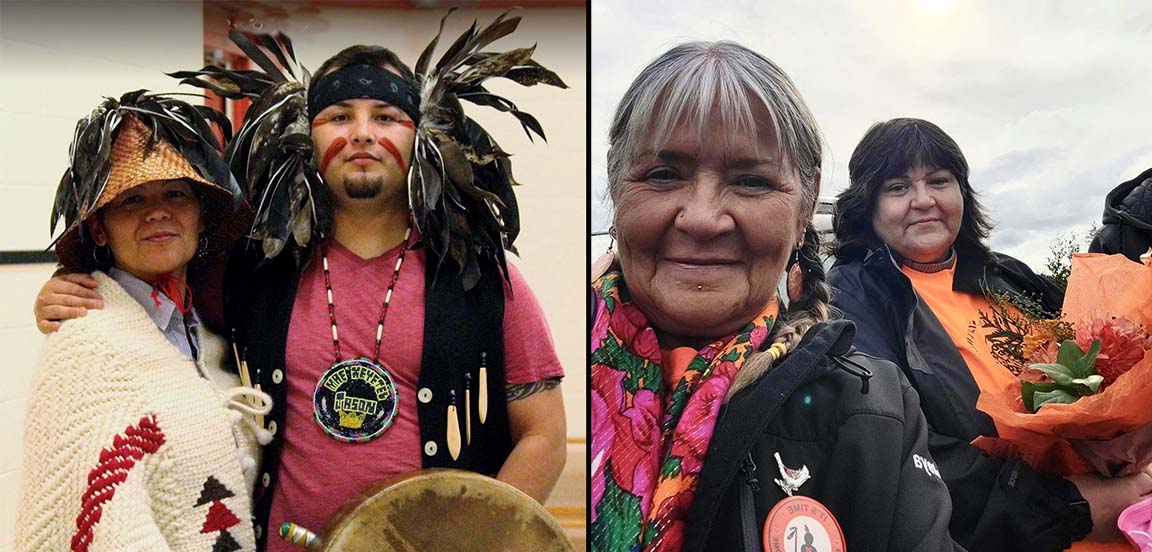
Pictured above: Chief Alice Thompson, Jason Thompson, Victoria L"Hirondelle, Dawn Styran
Leq’a:mel First Nation is located 22 kilometers east of Mission and 25 kilometers west of Agassiz. Their traditional territory “includes everything above and below the land, as far as the eye can see from Leq’a:mel, south to the Nooksack River, east to the Harrison knob, northwest to the north shore of Stave Lake, southwest to the northern shores of the Alouette Lake and down the west side of Silver Creek,” according to their assertion of title.
Led by Chief Alice Thompson and six Councillors, the First Nation has 600 members and is a signatory to the Stó:lō Nation. One of the community’s challenges is that Leq’a:mel is situated remotely with many services only offered in either Mission or Abbotsford. Transportation can sometimes be a challenge. Their goal is to develop more sustainability within the community and offer more services and supports in house.
With funding from the BC Aboriginal Child Care Society, Leq'a:mel First Nation is undertaking initiatives to look at the impacts of COVID on mental health, and specifically, “giving the kids a break away from their parents and grandparents, as well as giving the parents a break,” says Alice.
Another project they are working on is a walking trail. “It’s a challenge getting families out walking, so we’re going to be tidying up some of the trails we have so they’re safer, potentially getting some lighting to improve the safety." They are also developing some food security programs, with the ever increasing cost of food, and looking into community gardens. Leq’a:mel’s Health department are overseeing this program.
“Our families are very resilient and very strong and we are working on strategies to enhance the strengths they already have,” says Dawn Styran, Councillor and Designated Band Rep, who adds that it’s one of her goals to work herself out of a job.
COVID has presented some challenges. “Anxiety is showing up because the kids are getting bored. Typically we’d be having programs and activities, now that there is nothing for them to do, and the restrictions, they can get into trouble,” says Dawn. Leq’a:mel has approximately 100 children directly in community, not counting those off reserve.
An important member of the community is Jason Thompson who plays an integral role on the CARE Committee in the community. He brings with him previous experience working not only with Indigenous offenders but also prior to that he was a youth and events coordinator. Jason says that there are parallels between offenders and youth who are going through the child welfare system.
According to Chief Alice, Jason is very strong culturally and spiritually and the youth gravitate towards him. “He also brings that male side of the conversation and the fact that he has a young family adds to what has been missing in our committee since its inception in the 90s. Historically men were afraid to be a part of a committee that would often be seen as a woman’s role but in this decade men are stepping up and breaking that mold. They are valued for their contributions, not only as the protector and provider but also a caregiver. Jason is not afraid to ensure that the male/female aspects are considered in what we do for our children and families in our community and beyond,” says Alice.
Victoria L’Hirondelle, a member of the Care Committee who grew up in the child welfare system herself, says she can relate with families as to why they may be reluctant to share any personal concerns they may be having, for fear of having their children apprehended. “Our goal is to help and keep our families healthy and be there for them. We hope that they will feel more comfortable sharing and having a Community Care Member involved to assist them with understanding and utilizing the resources that are available. Hopefully seeing an “Elder” sit on this committee will encourage other Elders to get involved too. Having worked in Corrections herself, she agrees with Jason that there are definitely similarities with youth in the system and offenders in our jails, and this is what we want to prevent.
Dawn says the role of the committee members is vital to her work as a Designated Band Rep. “It is heart work and we give a part of our heart to each and every family we serve,” says Dawn.
Meet a FVACFSS Board Member: Tammy Bartz
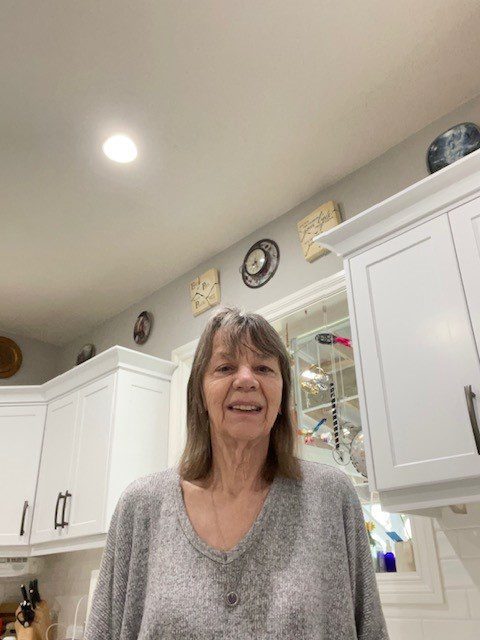
Tammy is from the Squiala First Nation and has a Social Services Diploma and a Degree in Adult Education. She has been an advocate for children and families for over 30 years and was a foster parent for many years outside of the system. She says that in those days, they didn’t get the Ministry involved, people just helped where they could. Tammy has nine children of her own, and 44 grandchildren and great grandchildren.
Tammy has been active with Xyólheméylh for many years, involved with the creation of the Executive Leadership Team structure, a member of the Care Committee in her community and a Designated Representative. She has also been an advocate for off reserve members. She believes that Bill C-92 provides an opportunity to make things better for Indigenous people. “We must support our children and families to overcome the residual effects of the residential school system and 60s scoop that was so damaging for Indigenous people,” says Tammy. “Families are the most important thing in life.”
Her advice for Xyólheméylh staff is that they come from a place of respect, kindness and non-judgement. She believes it’s important to listen to the children and to learn about attachment disorder.
She also believes that culture is about connectedness. “Ceremony is important, but the bottom line is connectedness – knowing who you are and who you belong to.” She is concerned about the impact that COVID is having on children and says she is seeing an increase in children suffering from anxiety and depression.
Tammy wants to send a big “thank you” to the support parents who work with Xyólheméylh. “So many of them go above and beyond. I can’t begin to express how grateful I am to them.”
administrative services team
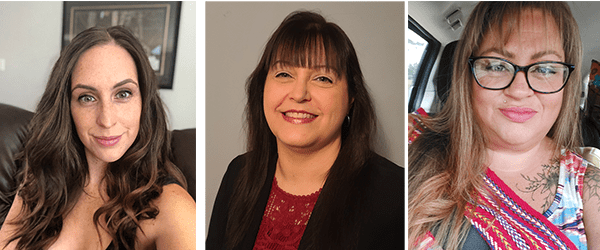
Xyólheméylh’s Administrative Services Team are part of the glue that holds the agency together, providing support to social workers, file maintenance and managing assets such as vehicles, telephones, laptops, as well as helping with logistics such as movers and maintenance people. They are the first point of contact in the offices and on the telephones and for every four delegated social workers there is one administration staff member behind them, providing support. A major project they are undertaking currently is transitioning the files to be consistent with MCFD standards. This project is huge and has been underway since 2019.
The team is led by Michaeline Fayant for the East Region (Chilliwack, Agassiz); Tracy Labreche for Central (Mission and Abbotsford) and Alexis Hillman for West Region (Langley and Surrey). They set the tone for the teamwork that happens between the regional teams. Michaeline, Tracy, and Alexis attribute the team work to good communication, collaboration, and respect for each other. The team may be divided into three regions but work together as one team to support each other. In fact, they say if there was one good thing that came out of COVID-19, it was that it improved the teamwork among the regions.
“I am so grateful for every person on my team,” says Alexis. “They work so hard.” She says that since joining the agency she has had many opportunities to grow professionally and is therefore very supportive of encouraging growth, cross-training, and succession planning. This sentiment is echoed by Michaeline and Tracy.
All three women are Indigenous themselves and enjoy being immersed and learning about their culture and seeing the similarities and differences between the First Nations they come from and the Stó:lō communities they serve. “Michaeline, who is partly Cree, says “We get to learn about our own culture as well as Stó:lō culture. I love that.” Alexis is Interior Salish and Tracy is Ojibwe from the Algonquins of Pikwakangan First Nation in Ontario.
Michaeline, Tracy, and Alexis all say that for them the thing they like most about working for the Agency is that is like a family. This sentiment is echoed by many staff who cite this sense of being a family is what distinguishes the agency from other workplaces. They attribute this quality to it being an Indigenous agency which places importance on family, belonging and a wholistic worldview of staff not just being workers but human beings. “We support each other 100 per cent,” says Tracy.
Recipe: Tourtiere

Submitted by Louis De Jaeger, Métis Nation BC Region Two Director and Minister of Economic Development and Natural Resources, from the Métis Cookbook and Guide to Healthy Living.
- 1 onion, chopped
- 1 lb. minced deer or moose meat
- 2 cloves garlic, minced
- 1/2 tsp savory
- 1/2 tsp sage
- 1/4 tsp. cloves
- 1/2 cup water
- 1/2 cup cooked mashed potatoes
- Pastry (a pie crust can be made or purchased at the store)
Place all the ingredients except pastry in saucepan. Put on simmer and stir frequently, uncovered for about 20 minutes. Allow to cool. Pour mixture into pastry lined pie pan. Cover with pastry. Bake at 425F for 30 to 45 minutes until top is well-browned. Enjoy!
BC Indigenous Youth Celebrate Pink Shirt Day Through Art
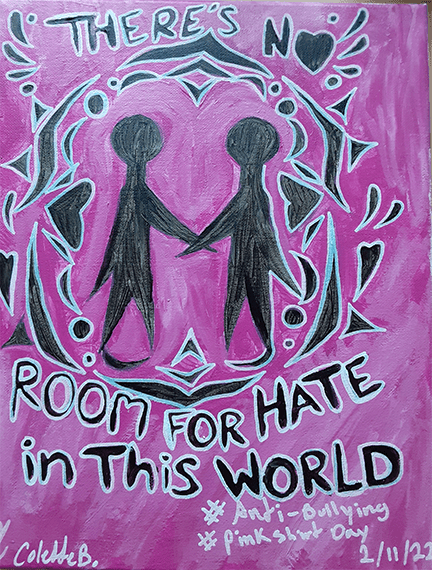
Xyólheméylh asked British Columbia children and youth to tell us how they stand up with kindness and lift others up. Over 50 children and youth entered the contest in three age categories with artwork, videos, and writing. The submissions were voted on by a panel of Elder advisors and Board of Director members.
The children and youth expressed the importance of not tolerating bullying, of being inclusive, and looking out for each other. “The entries show that the message of being kind and lifting each other up is really getting through to children and youth,” said Dr. Wenona Hall, President of the Xyólheméylh’s Board of Directors. “That is very beautiful and encouraging.”
Here are some of the things the children said:
"Kind is cool" - Dylan, 9
"Kindness is one size fits all" - Trinity, 9
"Don't bully. If someone is hurt, help them" - Bentley, 10
The Winning Entries
Ages 2 to 6: 1) Ben, 4; 2) Kaitlin, 5; 3) Caleb, 5
Ages 7 to 11: 1) Dylan, 9; 2) Sloan, 11; 3) Trinity, 9
Ages 12 to 19: 1) Colette, 13; 2) Calita, 14; 3) Dayton, 12
“We want to express our gratitude to all the children and youth who submitted their art, as well as the teachers who helped facilitate the contest by using it as a classroom project,” said Penny Trites, Xyólheméylh’s Executive Director of Staff and Community Relations. “It was truly inspiring.”
CYC 30th annual conversation on children & youth
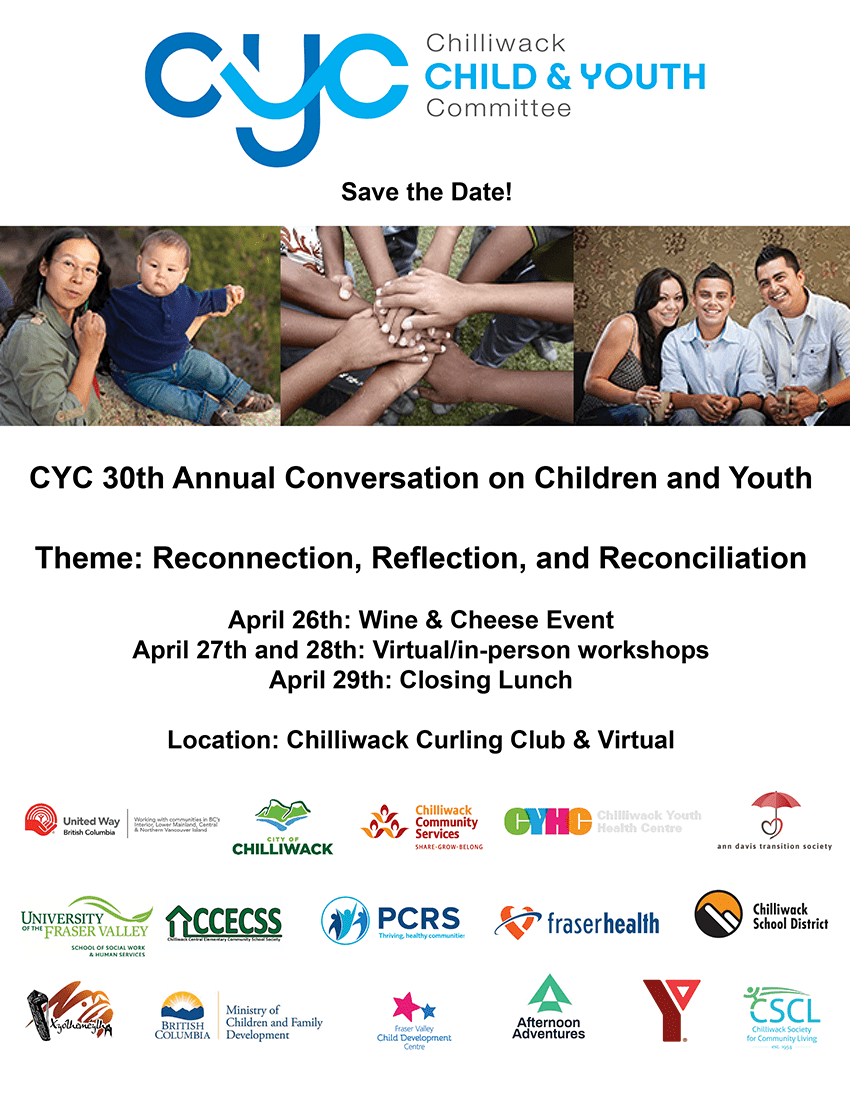
Save the date for this special event April 26 - 29 in Chilliwack!
virtual life skills group
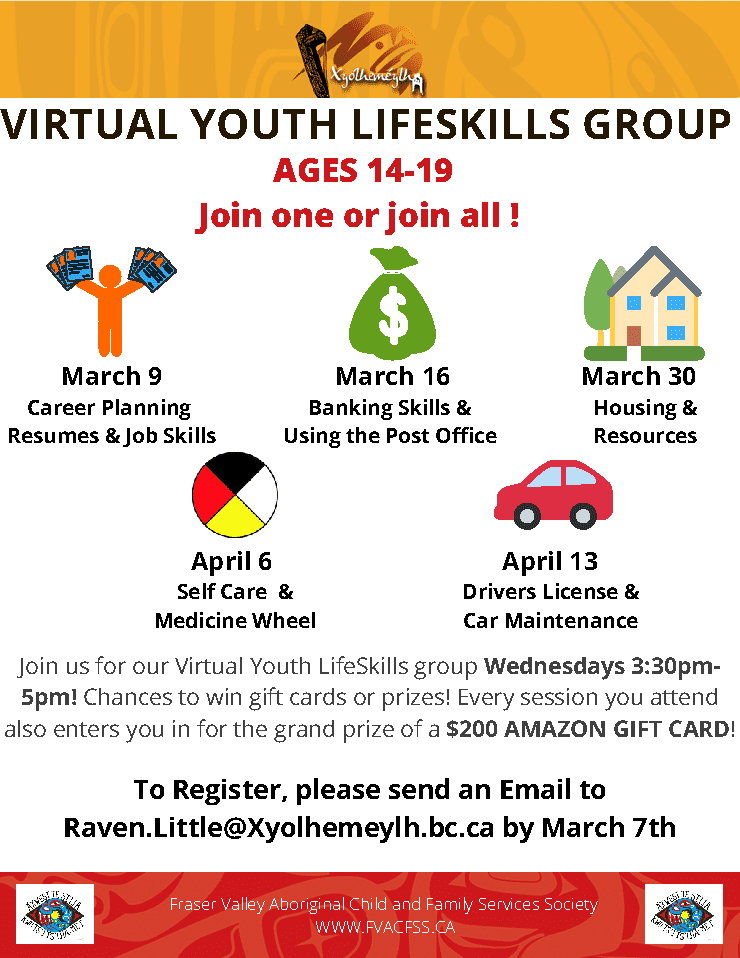
Visions and Voices: about the logo
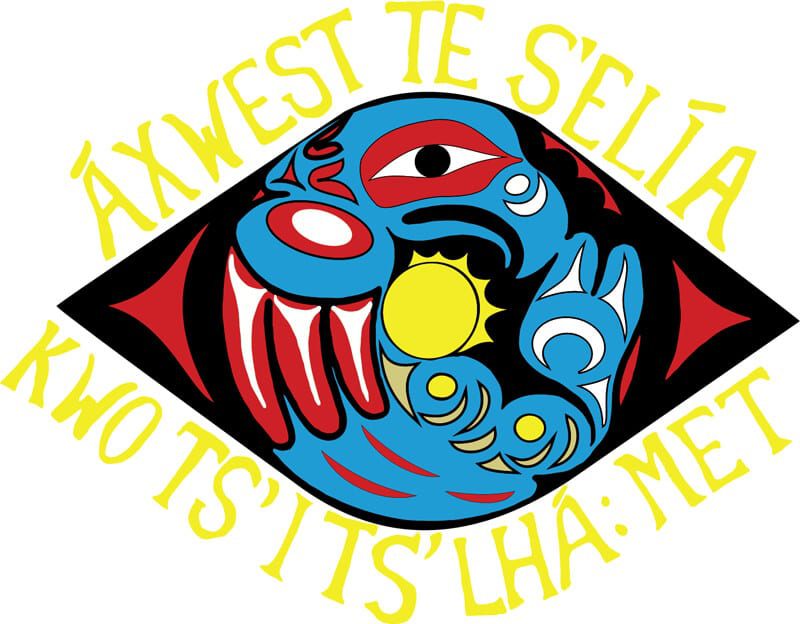
Visions and Voices is the name of Xyólheméylh’s youth advisory group – made up of youth in care or previously in care. The name Visions and Voices was given by Dan Ludeman in planning with the youth back in 2016. The following year the youth came up with the slogan "See the Vision... Be the Voice" which reflects their role in sharing their voice and creating their vision.
In 2018 the youth met with the Elders Advisory. Each member shared their experiences of being in the committee and the impact the group has had on them. They asked the Elders if they could bless the group with an animal. The Elders all discussed and decided to bless the group with the Eagle, because the Eagle flies highest to creator. The Eagle is strong and able to listen to all those that are smaller and able to reach the Creator and bring their voices forward.
The youth then undertook coming up with a logo. They brought all of their ideas to local Indigenous artist Anthony Gabriel, who took the ideas and created a sketch of the logo. He gave them permission to use it and play with it. The outline shape of the logo represents an eye. The sun in the middle represents the vision-to see the future. The eagle around the sun represents wisdom and strength, they fly highest to connect with the creator. The eagle is a reminder to be strong, creative and insightful.
your voice matters...survey for Xyólheméylh Caregiver Support Parents!
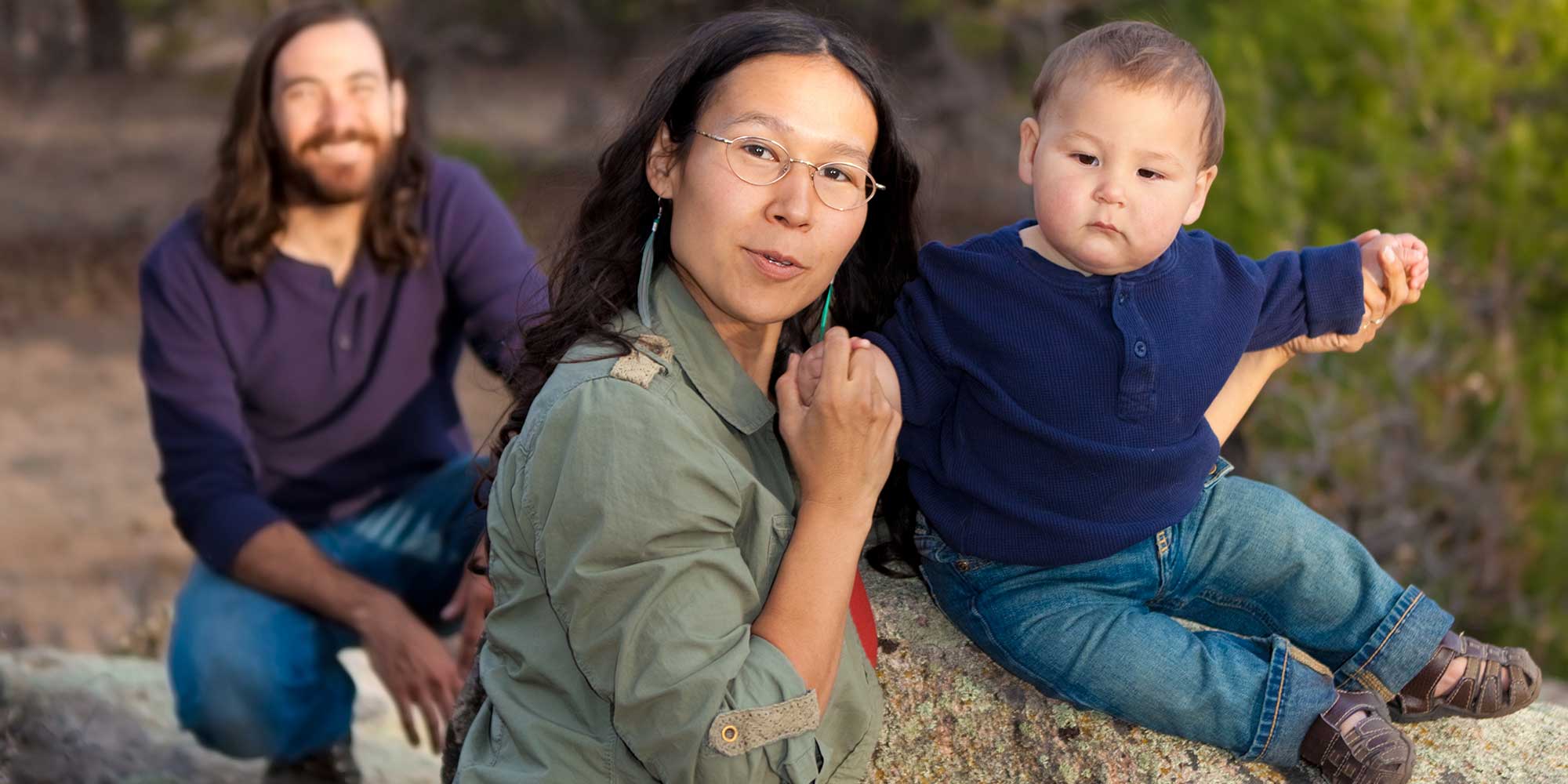
This is the survey we sent to Caregiver Support Parents earlier this year. We are still gathering feedback and suggestions. If you are a Caregiver Support Parent and were unable to fill out the survey, please connect with your Resource Social Worker to provide feedback on the following questions.
We strive to ensure connection to family and community and that the children and youth's inherent rights to heritage and identity are upheld in all we do. You play a key role in making a difference in the lives of the Indigenous children, youth and families we serve. We are currently working on a plan to strengthen our ability to ensure our services are delivered in a culturally appropriate manner that respects the Indigenous identity of the children and families we service. Your answers to the questions below will help us in doing this. We appreciate your time and honesty and look forward to working together in improving any gaps identified.
- On a scale of 1 to 10 how familiar are you with the Indigenous identity needs, community/nation name of Indigenous children/youth in your care? 10 being most familiar.
|
Not at All Familiar |
|
Somewhat Familiar |
|
Very Familiar |
|
1 |
2 |
3 |
4 |
5 |
|
☐ |
☐ |
☐ |
☐ |
☐ |
- What would you like to know more about to assist you better in your ability to care for Indigenous children/youth in your care?
- As you are caring for Indigenous children, youth and supporting their families, what do you feel is most important in ensuring the children and youth’s right to heritage and identity are upheld as a professional caregiver support parent?
- What are some ways that you incorporate culture and/or Indigenous values and ways of knowing into your day-to-day work supporting the children and/or youth in your home and their families?
- What methods do you currently use to ensure the children/youth’s inherent right to their Indigenous identity and connection to their home communities/nation is maintained?
- Would you be interested in one-on-one debriefing support from a member of our Agency Elder Advisory Council?
- In addition to the previous survey where we asked for training needs, please check any areas that you would like to see additional training on. Please note that culture is at the center of all we do and is embedded into all the services that are provided to Indigenous Children and Youth our agency serves.
____ Understanding Racism
____ Parent/Teen Conflict
___ Understanding Colonial Trauma
____ Self-Care/Wellness for Caregivers
____ How Caregivers Can Contribute to Indigenous Family Strengthening
____ Mindfulness and Emotional Regulation for Kids/Teens
____ The CALM Curriculum© training - is an innovative Canadian play-based curriculum specifically developed for young children, that connects neuroscience, theoretical research, and positive psychology to support and strengthen their social and emotional well-being.
We want to thank our caregiver support parents for completing this survey and sharing their valuable insights with us. Your voice matters and better allows us to develop a plan based on the results we receive. You are an integral part of our agency work family and we thank you.
